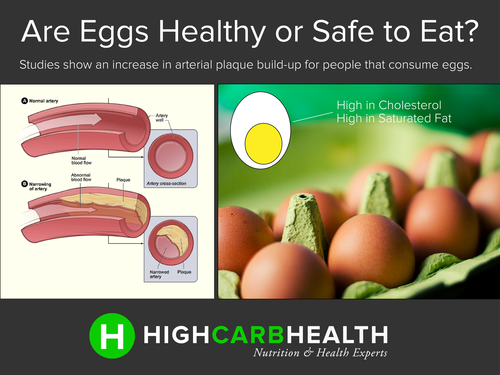
Eggs have traditionally been seen as an essential part of the human diet. Many health magazines and publications tout the benefits of eating eggs. In this edition of High Carb Health Talk, I delve into the scientific research completed on the consumption of eggs and provide you with a perspective on eggs and allow you to consider whether or not they aid our health. Regarding cholesterol, diabetes, and the way eggs are marketed, what does science tell us?
Eggs and Cholesterol
Eggs are loaded with high levels of cholesterol. In fact, eating one egg will put you over the recommended daily intake for cholesterol. Dietary cholesterol is not required as the human body is able to produce sufficient amounts through the body's own metabolic processes. In fact, the Harvard Nurses’ Health Study found that the daily consumption of the amount of cholesterol found in a single egg appeared to reduce life expectancy in the same way as smoking 25,000 cigarettes. You can see a similar exponential increase in arterial plaque build-up for smokers and egg-eaters. This tells us that contrary to common belief, eggs are definitely not a heart-healthy food; the evidence indicates the opposite is true.
Eggs and Diabetes
In the Spring Edition of Vegan New Zealand magazine, I wrote about diabetes and how excess fat is the real cause. Since eggs have a high caloric percentage of fat (1 egg contains about 5 g of fat), do they affect diabetes risk? The answer is yes; researchers have found a stepwise increase in risk based on how many eggs people eat. Eating just a single egg a week appeared to double the risk, and one egg a day tripled it! Remember Type 2 diabetes is one of the leading causes of death and amputations, blindness, and kidney failure. What happens if we eat eggs when we already have diabetes? Studies show eating one egg a day or more appears to shorten one’s lifespan and may double the risk of death for diabetics.
Egg Marketing
Eggs have long been marketed as healthy and full of necessary nutrients and protein. Dr. Michael Greger has a series of videos about eggs (nutritionfacts.org), and as a result of the Freedom of Information Act in the USA, we recently got to see what egg companies there are restricted from saying when using taxpayer dollars to market eggs. (Individual egg companies are allowed to say whatever they want if they are using their own funds.) FORBIDDEN PHRASES Because of existing laws against false and misleading advertising, the United States Department of Agriculture (USDA) did not allow egg industry professionals to describe eggs or egg products as:
- Healthy, healthful or nutritious – because eggs have high amounts of cholesterol (186 mg in a large egg), as well as high amounts of saturated fat, and therefore can contribute to the leading killer in the United States, heart disease
- Aiding in weight loss – they can’t be portrayed as a diet food because of the fat and cholesterol content, and they have nearly twice the calories allowed for the USDA low-calorie guidelines
- “Nutritional powerhouse", “egg-ceptional nutrition”, “pack a nutritional wallop”, “have high nutritional content”, “contribute nutritionally” or containing “healthful components”– see “healthy or nutritious” above
The message is clear. Even phrases like “Eggs are an important part of a well-balanced, healthy diet" would be considered misleading due to eggs’ fat and cholesterol. They can't even refer to eggs as safe. “All references to safety must be removed," because more than a hundred thousand Americans are poisoned with salmonella every year from eggs. WHAT’S LEFT? After those mighty efforts, advertising was finally approved for:
- “Find true satisfaction"
- “Can reduce hunger"
- “Fresh”
- “Affordable”
As we have seen, the reported health benefits of eggs that we may see are not justified. There is no valid reason to eat them. Eggs are definitely not nutritious, healthy, or safe to eat. They increase our risk of heart disease, stroke, and diabetes, and for these reasons, should never find our way onto our plate.
High Carb Health are Natural Health and Holistic Nutrition Practitioners. Our aim is to give people realistic advice on how to get healthy and reverse illness via a scientifically proven, nutrition-based approach to healing the body. Our goal is to provide long-term, lasting solutions. We do not believe in quick fixes and our approach is far more effective in promoting health and preventing disease than prescription drugs, surgery, vitamin and herbal supplementation, and genetic manipulation.
We provide education and coaching to help our clients transition to a healthier lifestyle, which also has the added benefit of assisting the body to reach its ideal weight. Fill in our Health Survey for a free 30-minute consultation.

